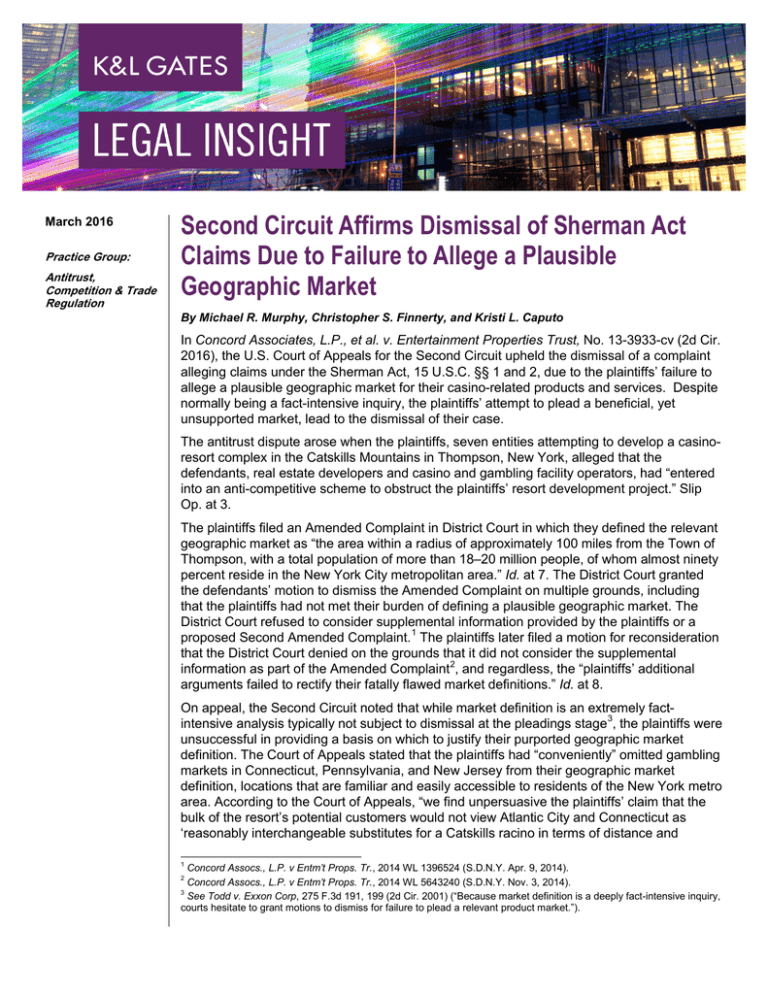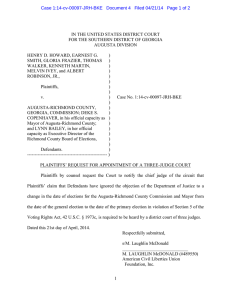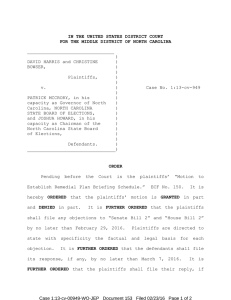Second Circuit Affirms Dismissal of Sherman Act Geographic Market
advertisement

March 2016 Practice Group: Antitrust, Competition & Trade Regulation Second Circuit Affirms Dismissal of Sherman Act Claims Due to Failure to Allege a Plausible Geographic Market By Michael R. Murphy, Christopher S. Finnerty, and Kristi L. Caputo In Concord Associates, L.P., et al. v. Entertainment Properties Trust, No. 13-3933-cv (2d Cir. 2016), the U.S. Court of Appeals for the Second Circuit upheld the dismissal of a complaint alleging claims under the Sherman Act, 15 U.S.C. §§ 1 and 2, due to the plaintiffs’ failure to allege a plausible geographic market for their casino-related products and services. Despite normally being a fact-intensive inquiry, the plaintiffs’ attempt to plead a beneficial, yet unsupported market, lead to the dismissal of their case. The antitrust dispute arose when the plaintiffs, seven entities attempting to develop a casinoresort complex in the Catskills Mountains in Thompson, New York, alleged that the defendants, real estate developers and casino and gambling facility operators, had “entered into an anti-competitive scheme to obstruct the plaintiffs’ resort development project.” Slip Op. at 3. The plaintiffs filed an Amended Complaint in District Court in which they defined the relevant geographic market as “the area within a radius of approximately 100 miles from the Town of Thompson, with a total population of more than 18–20 million people, of whom almost ninety percent reside in the New York City metropolitan area.” Id. at 7. The District Court granted the defendants’ motion to dismiss the Amended Complaint on multiple grounds, including that the plaintiffs had not met their burden of defining a plausible geographic market. The District Court refused to consider supplemental information provided by the plaintiffs or a proposed Second Amended Complaint. 1 The plaintiffs later filed a motion for reconsideration that the District Court denied on the grounds that it did not consider the supplemental information as part of the Amended Complaint2, and regardless, the “plaintiffs’ additional arguments failed to rectify their fatally flawed market definitions.” Id. at 8. On appeal, the Second Circuit noted that while market definition is an extremely factintensive analysis typically not subject to dismissal at the pleadings stage 3, the plaintiffs were unsuccessful in providing a basis on which to justify their purported geographic market definition. The Court of Appeals stated that the plaintiffs had “conveniently” omitted gambling markets in Connecticut, Pennsylvania, and New Jersey from their geographic market definition, locations that are familiar and easily accessible to residents of the New York metro area. According to the Court of Appeals, “we find unpersuasive the plaintiffs’ claim that the bulk of the resort’s potential customers would not view Atlantic City and Connecticut as ‘reasonably interchangeable substitutes for a Catskills racino in terms of distance and 1 Concord Assocs., L.P. v Entm’t Props. Tr., 2014 WL 1396524 (S.D.N.Y. Apr. 9, 2014). Concord Assocs., L.P. v Entm’t Props. Tr., 2014 WL 5643240 (S.D.N.Y. Nov. 3, 2014). 3 See Todd v. Exxon Corp, 275 F.3d 191, 199 (2d Cir. 2001) (“Because market definition is a deeply fact-intensive inquiry, courts hesitate to grant motions to dismiss for failure to plead a relevant product market.”). 2 Second Circuit Affirms Dismissal of Sherman Act Claims Due to Failure to Allege a Plausible Geographic Market regional character.’” Slip Op. at 14. Despite the fact that the Connecticut, Pennsylvania, and New Jersey facilities are nearly 125 miles from the New York metro area, as opposed to the 100-mile radius of the alleged market, the Court of Appeals explained that the plaintiffs had failed to “present a plausible basis for explaining why an additional twenty-five miles makes the difference.” Id. Moreover, the Court of Appeals rejected the plaintiffs’ argument that the Catskills area constituted a “unique” geographic market for a “racino” and hotel complex on account of its “regional character.” The plaintiffs based their claim on the area’s recognition as a tourist destination with “popular natural resources for water sports, mountain sports, hunting and gold.” Id. (quoting Am. Compl. ¶ 154). The Court of Appeals ultimately agreed with the District Court’s finding that the plaintiffs failed to show how their proposed resort differed from the myriad of other options for tourists seeking to combine a gambling trip, proximity to natural resources, and other related activities, available at relatively the same distance from the New York metro area as the Catskills. The Court of Appeals concurred with the lower court’s finding that “by arbitrarily excising those alternative options and essentially arguing that there are no comparable competitors, Plaintiffs exempt themselves from the requirement of defining the market according to the rules of interchangeability and cross-elasticity,” 4 which served to “further undermine the plausibility of their antitrust claims.” Slip Op. at 17. The Court of Appeals’ ruling in this case is significant because it demonstrates the Second Circuit’s readiness to assess and ultimately challenge geographic market definitions in Sherman Act cases at the pleadings stage. The Court of Appeals stated, “although market definition is a ‘deeply fact-intensive inquiry’ not ordinarily subject to dismissal at the pleadings stage, there is no ‘absolute rule’ against dismissal where the plaintiff has failed to articulate a plausible explanation as to why a market should be limited in a particular way.” Id. at 12. The courts recognized that plaintiffs were trying to manufacture a market to intentionally cut out other relevant customers that would injure their case. Due to the fact that plaintiffs could not plead a basis or justification for the manufactured market, it lead to the outright dismissal of the case instead of giving plaintiffs the ability to amend the complaint to re-plead a less beneficial market definition. Authors: Michael R. Murphy Christopher S. Finnerty Kristi L. Caputo michael.r.murphy@klgates.com +1 617 261 3132 chris.finnerty@klgates.com +1 617 261 3123 kristi.caputo@klgates.com +1 617 951 9023 4 Concord Assocs., L.P. v Entm’t Props. Tr., 2014 WL 1396524, at 17. 2 Second Circuit Affirms Dismissal of Sherman Act Claims Due to Failure to Allege a Plausible Geographic Market Anchorage Austin Fort Worth Frankfurt Orange County Beijing Berlin Harrisburg Palo Alto Paris Boston Hong Kong Perth Brisbane Houston Pittsburgh Brussels London Portland Charleston Los Angeles Raleigh Charlotte Melbourne Research Triangle Park Chicago Miami Dallas Milan San Francisco Doha Newark Dubai New York São Paulo Seattle Seoul Shanghai Singapore Sydney Taipei Tokyo Warsaw Washington, D.C. Wilmington K&L Gates comprises approximately 2,000 lawyers globally who practice in fully integrated offices located on five continents. The firm represents leading multinational corporations, growth and middle-market companies, capital markets participants and entrepreneurs in every major industry group as well as public sector entities, educational institutions, philanthropic organizations and individuals. For more information about K&L Gates or its locations, practices and registrations, visit www.klgates.com. This publication is for informational purposes and does not contain or convey legal advice. The information herein should not be used or relied upon in regard to any particular facts or circumstances without first consulting a lawyer. © 2016 K&L Gates LLP. All Rights Reserved. 3


